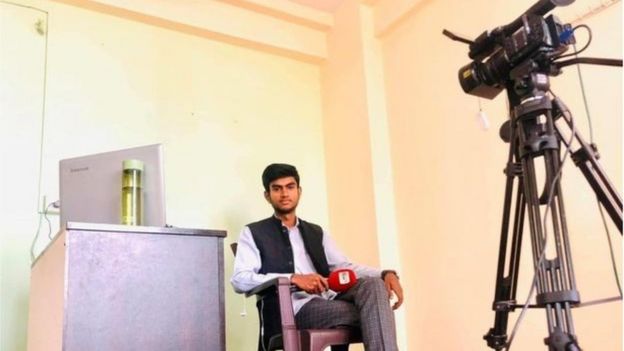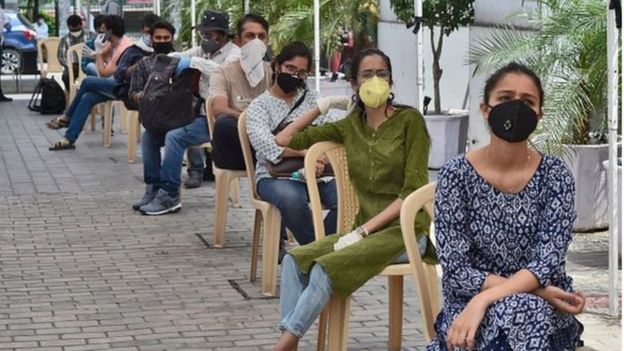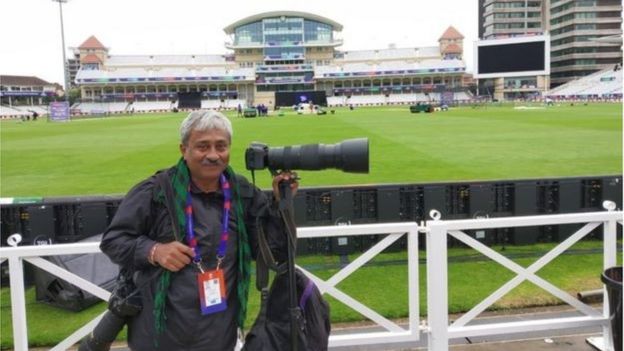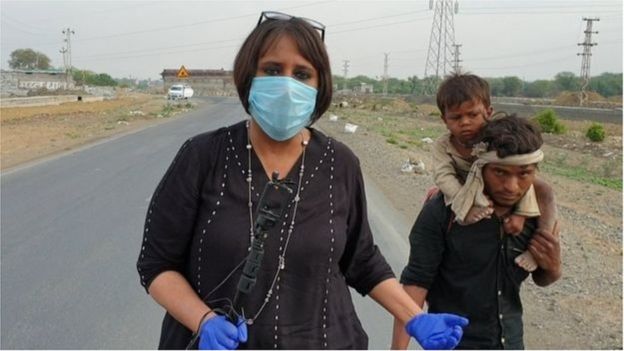 |
How is the corona virus wreaking havoc on India's news channels? |
Fifteen days ago, a camera operator working in the studio of a news network in Mumbai, India, along with his colleagues, tested the Corona virus, which was spreading rapidly in the city.
A few days later, the 35-year-old camera operator tested positive. He did not have any symptoms.
Prasad Kathe, editor of a TV channel called J Maharashtra, told me, "Everyone was shocked by this news. He did not even step out of the office.
Since then, the test results of 15 people in this Marathi language TV channel have been positive. Most of them are reporters and cameramen.
A few days ago, the TV channel banned its journalists from going to the field and most of the people are in quarantine in their homes.
The newsroom of the TV channel, which is housed in an eight-storey building in Mumbai's Andheri area, has been closed since then. There are now only two people, one an electrician and the other a production control room technician.
So far, the majority of the 120 employees of the TV channel have been tested and the results are awaited.
"Running a live news channel where people are infected with the virus has become a challenge. So we have arranged the work in such a way that the channel continues to run.
Now the channel is broadcasting 6 bulletins instead of 18 and the rest of the time the current programs are being broadcast.
It is not the only media organization, so far about 100 journalists have tested positive for the corona virus.
Most anchors are reading the news from their homes with cameras and branding of their channel in the background. The broadcast goes to the TV channel's production center via broadband and 4G mobile hotspots.
But people also have problems with it.

Prasad Kathe says there are many difficulties. "Occasionally there is a power outage in the anchor's house during the bulletin. Sometimes the internet shuts down. This is not an easy task but we are facing the situation and so far no bulletin has been released.
The Indian government has ordered people to stay at home, businesses and all public transport have been shut down, but most journalists are constantly going out for work and contracting the corona virus. The majority of these journalists belong to TV channels.
About 35 journalists have fallen ill in the southern city of Chennai. A sports photographer has died in the northern city of Calcutta after doctors say he was subjected to covid 19.
There are reports that 19 employees of a large media group in Ludhiana, Punjab, have tested positive. A few days ago, the group asked its employees to work from home.
So far, most cases have been reported in Mumbai, where more than 11,000 people have been diagnosed with the virus, with 340 deaths. Mumbai is India's financial and entertainment hub.
The city tested 167 journalists, of whom 53 tested positive. Three dozen of them have recovered and gone home, while the rest are being treated in hospitals. Many journalists are quarantined in their homes and hotels. In addition, about 170 journalists are awaiting trial.
 JTN IMAGES
JTN IMAGES
According to the Indian Council of Medical Research, the majority of people infected with the corona virus in the country have no symptoms or minor symptoms.
Why are so many journalists falling victim to the corona virus?
According to Vinod Jagdil, president of the Mumbai TV Journalists Association, there are several reasons for this.
"Journalists working on TV are under a lot of pressure to go out and make lockdown news and footage. In addition, some journalists are overly enthusiastic and do not take proper precautions when going out.
Many journalists use company taxis to get to work and work in offices where many people live in a small space. Those infected with the corona virus include at least three drivers who used to take journalists to work.
Now the situation is so bad that media networks have asked their journalists to work from home.
Vinod Jagdil says journalists are scared. Most have stopped going out. Even their officers are no longer pressuring them to go out and report.
Ronnie Roy was a Calcutta-based sports photographer who also did an assignment for BBC News six years ago. He was also among the journalists who had no fear of the corona virus.
 ABHIJIT ADDY
ABHIJIT ADDY
His last assignment was a cricket match in Rajkot, West Gujarat. He wore a mask and did regular protective work, such as washing his hands frequently. Several weeks after returning from the match, he developed a high fever and body aches.
On April 24, he fell asleep and complained of shortness of breath. He told a fellow photographer over the phone that he was not breathing. "Call an ambulance for me or I'll die," he said.
The ambulance arrived three hours later. An hour after arriving at the hospital, his condition worsened and he suffered a heart attack. Doctors did not even get a chance to test him. Medical officials say Roy may have fallen victim to Covid 19. His family was not allowed to attend his last rites.
There are clear guidelines for journalists reporting on Covid 19 that must be followed.
Journalist Barkha Dutt is reporting more on the effects of the epidemic and lockdown than any other journalist in India. She says she is taking every precaution during her patient work.
In less than a month, Dutt has traveled more than 4,000 km from his office in Delhi to six different states. His crew consists of three people and in addition to these people there is also a driver of the vehicle. None of them have been replaced in one month.
 PRASHANT TYAGI
PRASHANT TYAGI
Barkha Dutt told me that along with science, security arrangements have also changed. "We wear masks and gloves all the time. We make sure our mic is attached to a long stick so that we can stand away from the person we are interviewing.
"After each shoot, everyone loses their gloves and masks and cleans their hands and belongings with antiseptic lotion," he said.
When they went to the Covid 19 hospital in Indore, they all wore protective clothing and returned to their homes in Delhi instead of staying in a hotel after work. "We wanted to avoid the danger of sleeping on hotel beds."
Despite all these precautions, reporting this epidemic is a difficult and daunting task.



No comments:
Post a Comment